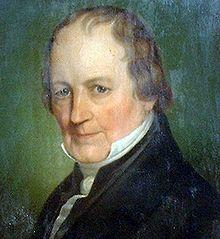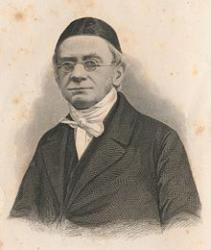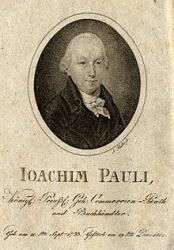
1767 - 1845 Person Name: Friedrich Adolph Krummacher Hymnal Number: 98 Author of "Als Nacht und Todesschatten" in Deutsches Gesangbuch Krummacher, Friedrich Adolf, was a native of Tecklenburg, Westphalia, where his father, Friedrich Jacob Krummacher was Burgomaster and Hoffiscal. He was baptized there, July 22, 1767, and apparently born July 13, 1767. In 1786 he entered the University of Lingen (since 1819 ranked as a Gymnasium), and in 1787 that of Halle. After concluding his theological studies in 1789, he was for some time tutor in the family of Senator Meyer in Bremen; was then appointed, in 1790, Conrector of the Gymnasium at Hamm, and in 1793 Rector of the Gymnasium at Mors (Meurs), near Düsseldorf. In the end of 1800 he became Professor of Theology and Eloquence at the Reformed University of Duisburg. When, after the battle of Jena (Oct. 14, 1806), Duisburg was taken from Prussia, the salaries of the professors ceased, but Krummacher lectured on till his audience consisted of one student. He was then, in the autumn of 1807, appointed pastor of Kettwig, on the Ruhr; in 1812 Chief Court Preacher and General Superintendent at Bernburg; and finally, in 1824, he became chief pastor of the St. Ansgarius Church at Bremen. By reason of growing infirmities he resigned his charge in June, 1843, and died at Bremen, April 4, 1845 (0. Kraus, 1879, p. 310; Blätter für Hymnologie, 1886, p. 80, &c).
Krummacher is best known as a preacher; and as the author of the well-known Parabeln, first published in 1805, which passed through many editions, and ranks as the standard German work of its class. His hymns are little suited for church use, being often allegorical and high-flown, and not for the most part sufficiently simple and direct, though in some cases he does write in a popular, natural style, and with a beauty of his own. His hymns mostly appeared in his Festbüchlein, a work consisting of allegorical narratives, conversations, &c, with interspersed hymns. Of this the 1st part, entitled Der Sonntag, was published 1808 (2nd ed. 1810; 3rd ed. 1813; 4th ed. 1819); pt. ii., entitled Das Christfest, in 1810 (2nd ed. 1814; 3rd ed. 1821); and pt. iii., entitled Das Neujahrsfest, in 1819.
Those of Krummacher's hymns translated into English are:—
i. Allgemach aus Dammerung und Nacht. Advent. In his Festbüchlein, pt. ii., 1810 (1814, p. 154), in 5 stanzas of 4 lines, entitled "The Prophets of Nature"; and given after the conversation on Zacharias, the father of St. John the Baptist. Included as No. 34 in J. P. Lange's Deutsches Kirchenliederbuch, Zurich, 1843. The unity of idea is violated by the concluding lines of st. v.
"Wie die leisen Lispel den Propheten
Einst auf Horeb's Felsenspitz umwehten."
And thus in his preface, p. vii., Dr. Lange sug¬gests that st. v. should read thus:—
"Allgemach und siegreich fort und fort
Bricht durch unser Fleisch das ew'ge Wort;
Die Propheten grüsst es durch Gesichte,
Dann wird's Mensch und himmlische Geschichte."
Translated as:—
Slowly, slowly from the caves of night. A full and good tr. from Lange by Dr. Kennedy, as No. 42 in his Hymnologia Christiana, 1863.
ii. Eine Heerde und ein Hirt. Missions. First published in the 3rd. ed., 1821, of pt. ii. of his Festbüchlein, p. 163, in 6 stanzas of 6 lines, at the close of the section on "Israel and the Strangers." In the Berlin Geistliche Lieder Schatz, ed. 1863, No. 1365, and many other recent collections. The translations are:—
1. One, only One, shall be the fold. By Miss Dunn, in her Hymns from the Germany 1857, p. 49.
2. One Shepherd and one fold to be. In Cantica Sanctorum, 1880, No. 96.
iii. Ja furwahr! uns fiihrt mit sanfter Hand. Ps. xxiii. In his Festbüchlein, pt. i. (3rd ed. 1813, p. 118), in 5 stanzas of 4 lines, with Hallelujahs. It is given in the story of the festal rededication of a village church destroyed in time of war, as a choral hymn sung by boys and girls after the Holy Communion. In the Württemberg Gesang-Buch, 1842, No. 72. Translated as:—
1. Yes! our Shepherd leads with gentle hand, Through. A good and full translation by Miss Borthwick, in Hymns from the Land of Luther, 1st Ser., 1854, p. 59 (1884, p. 60), repeated in Kennedy, 1863; Mrs. Brock's Children's Hymn Book, 1881; the Christian Hymn Book, Cincinnati, 1865, and others.
2. Yea! our Shepherd leads, with gentle hand, Along. In full by M. W. Stryker, as No. 164 in his Christian Chorals, 1885.
iv. Hag auch die Liebe weinen. Love, Faith and Hope. Festbüchlein, pt. i., 1808, p. 136, in 3 st. of 4 1., in the section entitled "The Setting Sun," for Sunday evening. It is appended to a story in which the father has been speaking of the Resurrection of Christ the Sun of Righteousness, as celebrated on that day, the hymn being introduced as sung by the family and neighbours, as he ceased to speak. Included in the Württemberg Gesang-Buch, 1842, No. 628. It is most suited to be sung at a choral funeral. Koch, 2nd ed., iv. p. 695, says it was sung at the author's funeral at Bremen, April 10, 1845, and that st. iii. is on the cross over his grave. He adds that stanzas i., iii. were sung July 17, 1850, at the funeral of Dr. August Neander, the church historian in Berlin; followed by an address by Krummacher’s son, Friedrich Wilhelm (author of the well-known Elijah, Elisha and other works). Tr. as:—
Though Love may weep with breaking heart. A good and full translation by Miss Winkworth in her Lyra Germanica, 2nd Ser., 1858, p. 121. Repeated in Flett's Collection, Paisley, 1871, and in H. L. Hastings's Songs of Pilgrimage, 1887.
Other translations are, (1) "Let love weep,—It cometh," by Miss Warner, 1858, p. 584. (2) "Yea, Love may weep when death prevails," by Dr. G. Walker, 1860, p. 57.
A number of other pieces by Krummacher are translated in the Sacred Lyrics from the German, Philadelphia, 1859; by C. T. Brooks, 1847; by Mrs. Follen, 1851, and by Miss Fry, 1859. As they are poems rather than hymns they are not noted here. [Rev. James Mearns, M.A.]
--John Julian, Dictionary of Hymnology (1907)
Frederic Adolphus Krummacher


